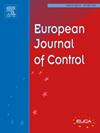Robust iterative learning control of continuous delayed singular multi-agent systems with polytopic uncertainty and non-identical initial conditions: LMI approach
IF 2.6
3区 计算机科学
Q2 AUTOMATION & CONTROL SYSTEMS
引用次数: 0
Abstract
This paper addresses the leader-follower control problem for continuous delayed singular multi-agent systems (DSMAS) with uncertainties. This issue is particularly challenging due to the presence of polytopic uncertainty and independent initial conditions. To overcome these challenges, we propose a robust iterative learning control (RILC) with a rectified reference strategy for the DSMAS. The novelty of our approach lies in the introduction of the RILC, which deals with polytopic uncertainty, different independent initial conditions, and ensures monotonic convergence of the input in the 2-norm sense for the DSMAS, simultaneously. To establish stability, we derive sufficient criteria using the performance index and Lyapunov–Krasovskii functional and determine the RILC gains through linear matrix inequalities (LMIs). Finally, the proposed theory is validated through both numerical and practical examples, with simulation results demonstrating its capability and effectiveness.
具有多面体不确定性和非相同初始条件的连续延迟奇异多智能体系统的鲁棒迭代学习控制:LMI方法
研究了具有不确定性的连续延迟奇异多智能体系统(DSMAS)的领导-跟随控制问题。由于多面体不确定性和独立初始条件的存在,这一问题尤其具有挑战性。为了克服这些挑战,我们提出了一种具有修正参考策略的稳健迭代学习控制(RILC)。我们方法的新颖之处在于引入RILC,它处理多面体不确定性,不同的独立初始条件,并同时确保DSMAS在2范数意义上的输入单调收敛。为了建立稳定性,我们利用性能指标和Lyapunov-Krasovskii泛函推导出充分的判据,并通过线性矩阵不等式(lmi)确定RILC增益。最后,通过数值算例和实际算例对所提理论进行了验证,仿真结果验证了所提理论的能力和有效性。
本文章由计算机程序翻译,如有差异,请以英文原文为准。
求助全文
约1分钟内获得全文
求助全文
来源期刊

European Journal of Control
工程技术-自动化与控制系统
CiteScore
5.80
自引率
5.90%
发文量
131
审稿时长
1 months
期刊介绍:
The European Control Association (EUCA) has among its objectives to promote the development of the discipline. Apart from the European Control Conferences, the European Journal of Control is the Association''s main channel for the dissemination of important contributions in the field.
The aim of the Journal is to publish high quality papers on the theory and practice of control and systems engineering.
The scope of the Journal will be wide and cover all aspects of the discipline including methodologies, techniques and applications.
Research in control and systems engineering is necessary to develop new concepts and tools which enhance our understanding and improve our ability to design and implement high performance control systems. Submitted papers should stress the practical motivations and relevance of their results.
The design and implementation of a successful control system requires the use of a range of techniques:
Modelling
Robustness Analysis
Identification
Optimization
Control Law Design
Numerical analysis
Fault Detection, and so on.
 求助内容:
求助内容: 应助结果提醒方式:
应助结果提醒方式:


